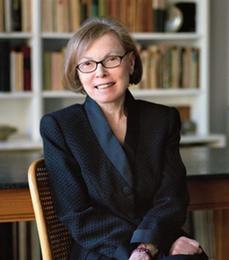 |
|
| Janet Malcolm | |
Janet Malcolm, "a longtime writer for the New Yorker who was known for her piercing judgments, her novel-like nonfiction and a provocative moral certainty that cast a cold eye on journalism and its practitioners," died June 16,the New York Times reported. She was 86. Malcolm "produced an avalanche of deeply reported, exquisitely crafted articles, essays and books, most devoted to her special interests in literature, biography, photography, psychoanalysis and true crime. Her writing was precise and analytical; her unflinching gaze missed nothing."
One of her best known works was The Journalist and the Murderer, a forensic examination of the relationship between author Joe McGinniss and convicted murderer Jeffrey MacDonald, which was published as a two-part essay in the New Yorker in 1989 and as a book the following year. The Times noted: "One of the through lines in her work was a merciless view of journalism, never mind that she was one of its most prominent practitioners."
Malcolm's books include Diana & Nikon: Essays on the Aesthetic of Photography; The Silent Woman: Sylvia Plath & Ted Hughes; Reading Chekhov: A Critical Journey; Iphigenia in Forest Hills: Anatomy of a Murder Trial; The Purloined Clinic: Selected Writings; and Nobody's Looking at You: Essays. Among her honors are the 2008 PEN/Jacqueline Bograd Weld Award for Biography for Two Lives: Gertrude and Alice; and the 2013 National Book Critics Circle Award (Criticism) shortlist for Forty-One False Starts.
Describing Malcolm as "a dear friend," New Yorker editor David Remnick wrote in a tribute: "From her early pieces on the world of psychoanalysis to her most recent Profiles, her reputation often seemed to rest as much on her razor-sharp acuity as on the enormous intelligence of her prose. And yet she was immensely kind, full of scrupulous self-questioning about all acts of definitive judgment. Tilting her head slightly, her eyes narrowing, she seemed, catlike, to take everything in. And, when she sat down to write, the instrument of her prose was equal to the intelligence and range of her mind....
"In the coming days, you'll be able to read many obituaries and appreciations of Janet's work here and elsewhere. But, in the immediate hours and days after her death, we hope that you'll read her work.... Her sentences, clear as gin, spare as arrows, are like no one else's. And her considerations--of psychoanalysis, of biography, and of journalism itself--are all examples of a rare and utterly free mind at work."
Writer Nathan Heller tweeted: "No greater feat for a nonfiction writer than to invent a way of seeing and saying that renders a whole constellation of illuminating, not obvious, and previously unrenderable relationships--and to do it in a way that's utterly distinctive but unoccluded by ego. RIP Janet Malcolm."
New Yorker writer Alec Wilkinson observed: "A person as exceptional as Malcolm was something like an archive of sensibility and thought, one that is irreplaceable, and when such a person dies it is, as John Updike said, of William Maxwell, as if a library has burned. People such as Malcolm, who appear to be so much themselves, are rare and inspiring, and the loss of such a person is an impoverishment."
"We are each of us an endangered species," Malcolm wrote in a 2018 New Yorker piece. "When we die, our species disappears with us. Nobody like us will ever exist again."

